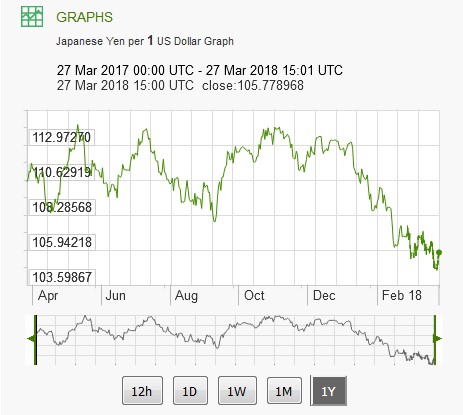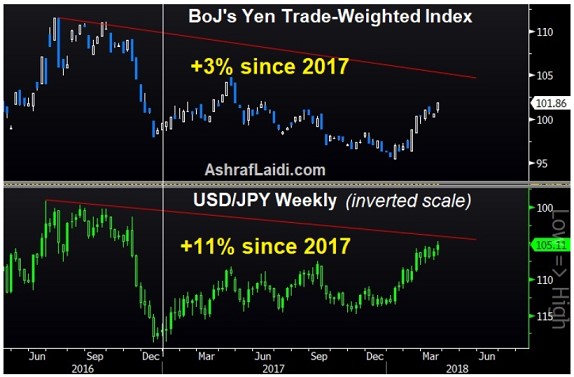In late 2017, leading financial markets navel-gazer Morgan Stanley made a well-calculated prognosis that the Japanese Yen would be a standout performer in 2018 as inflation finally returned to the world's third-largest economy.
The Japanese economy has been afflicted by deflation and negative interest rates for decades, despite the Bank of Japan's desperate measures to nudge the country's citizens to spend more.
Well, it turns out JPM was spot on with its predictions. The yen has rallied 7 percent against the dollar in the first three months of the year, from a high of nearly ¥113 to near multi-year lows.

Source: X-Rates
Japan's current inflation reading of 0.9 percent is still far from the Bank of Japan’s target rate of 2 percent by 2019.
Even worse is the fact that various macroeconomic factors are likely to hinder the achievement of that goal.
First off, Japanese inflation rates are fairly sensitive to exchange rates. A strengthening yen is likely to suppress the consumer index, leading to lower inflation growth.
Japan's strong economy is also likely to increase deflationary pressure. A robust economy tends to prop up the yen, which is bad news for a country that has recorded eight straight quarters of growth.
But while it may appear that Japan has become a victim of its own success, a weak dollar is mostly to blame.
Unfortunately, the unfolding situation is not entirely in Japan's hands. Related: The Challenge Of Reducing The Trade Deficit
The huge rally by the yen against the dollar has got much more to do with a weakening buck than a strengthening yen.
We can discern this by looking at another metric--the trade-weighted yen index. The dollar-yen pair has moved 11 percent since January 2017 in favor of the yen, yet the yen has only climbed 3 percent on a trade-weighted basis over the timeframe. This suggests that the greenback has weakened a lot more than the yen has strengthened.

(Click to enlarge)
Source: MarketWatch
Meanwhile, it's been a tough start to the year for the greenback after losing 2.6 percent against a basket of major world currencies
Dollar Index(UUP) Year-to-Date Change

(Click to enlarge)
Source: CNN Money
The upshot of this is that any direct intervention by the Bank of Japan is likely to have only a limited effect on any efforts to accelerate inflation
It's not all doom and gloom though for Japan's economic aspirations.
The dollar has rebounded from its 16-month low thanks to fears of impending trade wars receding somewhat. President Trump had earlier ordered tariffs on Chinese goods worth at least $50 billion to which Beijing responded by slapping retaliatory tariffs worth $3 billion on U.S. goods and threatened to inflict more pain. This came hot on the heels of a recent blanket tariff on steel and aluminum entering the country.
The latest reports, however, indicate that Secretary of Treasury Steve Mnuchin had met a Chinese official to discuss how to avert a full-blown trade war. The dollar gained about 30 basis points against the yen on the news, but it was too little to undo the months-long damage.
Meanwhile, Japan will be hoping that the Tokyo Olympics of 2020 will bring in an influx of tourists and help increase local spending and boost inflation. Slow wage growth, however, is likely to nullify those positive vibes according to Credit Suisse's chief economist for Japan, Hiro Shirakawa.
By Josh Owens for Oilprice.com
More Top Reads From Safehaven.com:
















